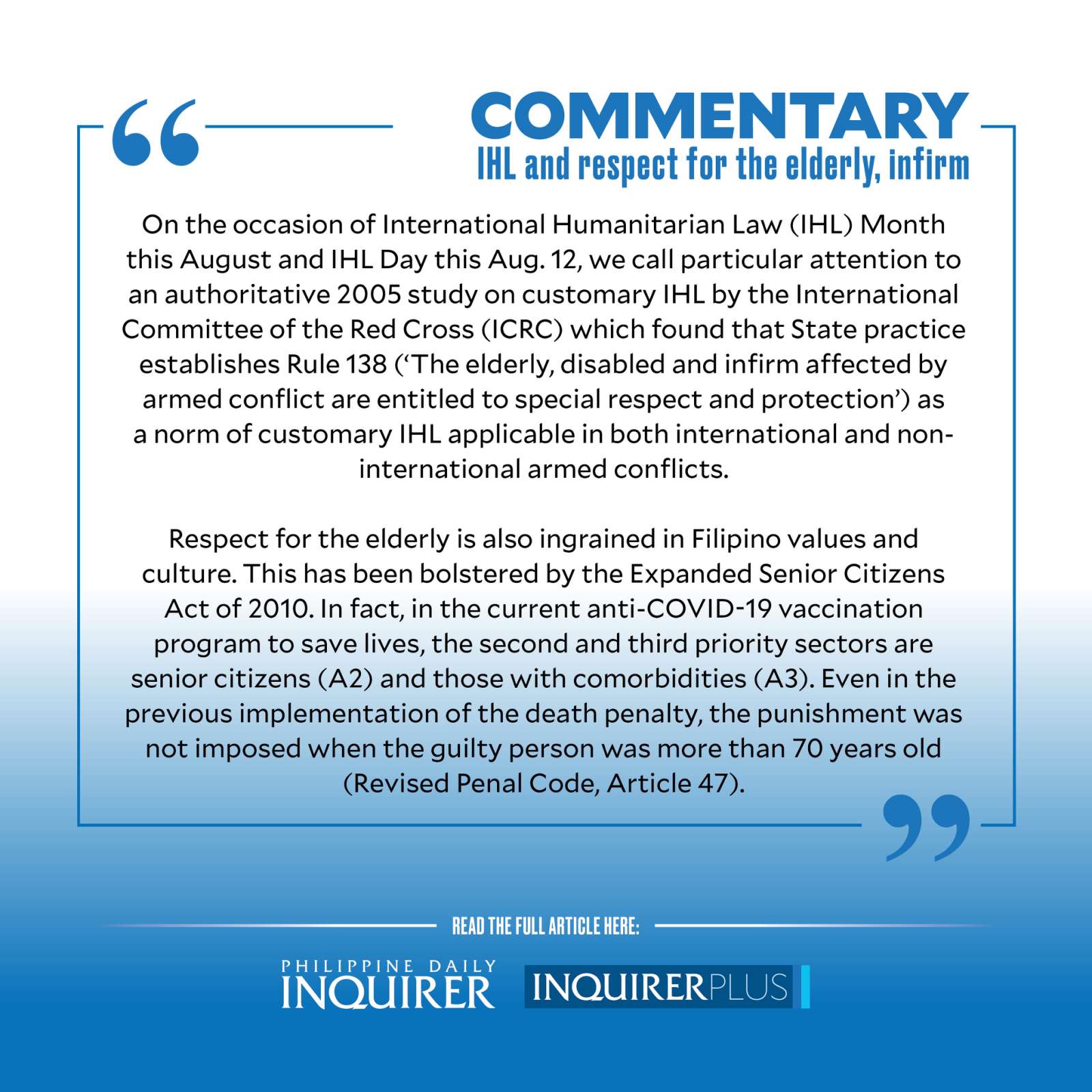IHL and respect for the elderly, infirm

On the occasion of International Humanitarian Law (IHL) Month this August and IHL Day this Aug. 12, we call particular attention to an authoritative 2005 study on customary IHL by the International Committee of the Red Cross (ICRC) which found that State practice establishes Rule 138 (“The elderly, disabled and infirm affected by armed conflict are entitled to special respect and protection”) as a norm of customary IHL applicable in both international and non-international armed conflicts.
Respect for the elderly is also ingrained in Filipino values and culture. This has been bolstered by the Expanded Senior Citizens Act of 2010. In fact, in the current anti-COVID-19 vaccination program to save lives, the second and third priority sectors are senior citizens (A2) and those with comorbidities (A3). Even in the previous implementation of the death penalty, the punishment was not imposed when the guilty person was more than 70 years old (Revised Penal Code, Article 47).
We recall the foregoing rules of customary IHL and of Philippine good customs and public policy because of certain incidents in the past two years in the context of the local communist armed conflict, whereby certain “high-value” leaders and personalities associated with the Communist Party of the Philippines-New People’s Army-National Democratic Front of the Philippines (CPP-NPA-NDFP) of senior age and reportedly frail health have been killed in late night or early morning raids at their places of lodging either by definitely police/military units or by still unknown perpetrators, though largely suspected to be state-inspired.
In the former case, the killings were invariably justified by the concerned police/military commanders to be due to the armed resistance (“nanlaban”) of those who were subjects of warrants of arrest being served. We refer to the following incident dates, places, and killed “Red” personalities:
March 13, 2020, Baguio City—CPP vice-chair Julius Giron, 67, and reportedly ailing; killed along with him was his personal doctor Lourdes Tan Torres
Aug. 10, 2020, Novaliches, Quezon City—Anakpawis party-list chair and NDFP peace consultant Randall Echanis, 72
Nov. 25, 2020, Angono, Rizal—CPP central committee-level leaders and spouses Eugenia Magpantay and Agaton Topacio, both 69 and reportedly ailing
Dec. 26, 2020, Oton, Iloilo—CPP executive committee-level leader Antonio Cabanatan, 74, a hunchback, and his wife Florenda Yap, 65, both reportedly ailing
May 28, 2021, Pavia, Iloilo—CPP-Panay leader Reynaldo Bocala, 74
May 28, 2021, Camotes Island, Cebu— Claimed NDFP peace consultant Rustico Tan, 80, reportedly shot dead while sleeping on a hammock at home
At least where police/military units are involved in serving warrants of arrest, and where the subjects are elderly, disabled, and infirm (something that good police/military intelligence should have updated information on), and do not put up armed resistance (which is highly unlikely from such persons, especially when made aware of being surrounded by an overwhelming armed force), can the concerned police/military commanders not, as a matter of policy and practice, exhaust options for the voluntary surrender of such persons and avoidance of unnecessary loss of life, in the spirit of the above-cited IHL customary rule and Philippine good customs and public policy on special respect and protection for the elderly? Or can we rely for this only on the use of body-worn cameras in the execution of warrants?
The CPP is on record as holding President Rodrigo Duterte (76), National Security Adviser Hermogenes Esperon, Jr. (69), Defense Secretary Delfin Lorenzana (72), and Local Governments Secretary Eduardo Año (59 going on 60) as command-responsible for the above-said killings of “Red” personalities, and for thus ordering the NPA to undertake punitive action against them and the directly responsible police/military officers. Would it be too much to also ask the CPP-NPA to accord special respect and protection for the elderly when it comes to its punitive actions? After all, CPP leader Jose Maria Sison is already 82.
* * *
Soliman M. Santos Jr. is a senior citizen; a long-time human rights and IHL lawyer; legislative consultant and legal scholar; peace advocate, researcher, and writer; author of a number of books; founding and long-time coordinator, now chair emeritus, of the Philippine Campaign to Ban Landmines; and a new member of the editorial board of the International Review of the Red Cross. The views here are his own.
















